- Home
- Don DeLillo
Point Omega Page 7
Point Omega Read online
Page 7
The call came early. Searchers had found a knife in a deep ravine not far from an expanse of land called the Impact Area, entry prohibited, a former bombing range littered with unexploded shells. They'd secured a perimeter around the object and were expanding the search. The ranger was careful not to refer to the knife as a weapon. Could be a hiker's or camper's, any number of uses. He set the approximate location of a dirt road that approached the site and when we finished talking I found Elster's map and quickly spotted the Impact Area, a large swatch of geometry with squared-off borders. There were thin wavery lines to the west-canyons, washes and mine roads.
Elster was in his room sleeping and I leaned over the bed and listened to him breathe. I don't know why I closed my eyes when I did this. Then I checked his medicine cabinet to make sure the number of pills and tablets in various bottles had not diminished by a noticeable amount. I made coffee, set a place for him and left a note saying I'd gone into town.
Blade seemed free of blood, the ranger had said.
I drove toward town and then veered east for a time and finally down toward the area in question. I left the paved road and followed a rutted track into a long sandy wash. Soon there were tall seamed cliff walls crowding the car and it wasn't long before I reached a vehicle dead end. I put on my hat, got out and felt the heat, the brunt, the force of it. I opened the trunk and raised the top of the cooler where a couple of water bottles lay in melted ice. I didn't know how far I was from the search site and tried to call the ranger but there was no signal. I moved around squat boulders dislodged from the heights by flash flooding or seismic events. The rough path here looked and felt like crumbled granite. Every so often I'd stop and look up and see a sky that seemed confined, compressed. I spent long moments looking. The sky was stretched taut between cliff edges, it was narrowed and lowered, that was the strange thing, the sky right there, scale the rocks and you can touch it. I started walking again and came to the end of the tight passage and into an open space choked at ground level with brush and stony debris and I half crawled to the top of a high rubble mound and there was the whole scorched world.
I looked out into blinding tides of light and sky and down toward the folded copper hills that I took to be the badlands, a series of pristine ridges rising from the desert floor in patterned alignment. Could someone be dead in there? I could not imagine this. It was too vast, it was not real, the symmetry of furrows and juts, it crushed me, the heartbreaking beauty of it, the indifference of it, and the longer I stood and looked the more certain I was that we would never have an answer.
I had to get out of the sun and skidded back down to flat land and a wedge of shade, where I took the water bottle out of my back pocket. I tried again to call the ranger. I wanted him to tell me where I was. I wanted to know where he was, with precise directions this time. I wanted to reach the scene just to see, to feel what was there. I assumed the knife was on its way to a crime lab somewhere in the county. I assumed the sheriff had acted on the information I'd given him about the phone calls that Jessie's mother had been getting from the Blocked Caller. Dennis. I thought of him as Dennis X. Was there legal cause to trace the phone calls? Did the mother remember the man's name correctly? Would the father still be in bed, swallowed by memories, immobilized, when I walked into the house? The water was lukewarm and chemical, broken down to molecules, and I drank some and poured the rest over my face and down my shirt.
I walked back into the wash under the shallow line of sky and then stopped and put my hand to the cliff wall and felt the tiered rock, horizontal cracks or shifts that made me think of huge upheavals. I closed my eyes and listened. The silence was complete. I'd never felt a stillness such as this, never such enveloping nothing. But such nothing that was, that spun around me, or she did, Jessie, warm to the touch. I don't know how long I stood there, every muscle in my body listening. Could I forget my name in this silence? I took my hand off the wall and put it to my face. I was sweating heavily and licked the moist stink off my fingers. I opened my eyes. I was still here, in the outside world. Then something made me turn my head and I had to tell myself in my astonishment what it was, a fly, buzzing near. I had to say the word to myself, fly. It had found me and come near, in all this streaming space, buzzing, and I swatted vaguely at the sound and then started back toward the dead end. I moved slowly and stayed near the wall, in intermittent shade. After a time I began to think I should have reached the car by now. I was tired, hungry, water was gone. I wondered whether this gap, this pass had a north and south fork and was it possible I had strayed into the wrong fork? I could not convince myself that it was not possible. The sky seemed to taper toward a point where the cliff walls met and I thought of turning back. I took the water bottle out of my pocket and tried to squeeze a drop or two into my mouth. Every few steps I told myself to turn back but kept going forward, increasing the pace. I wasn't sure that this was the same crushed granite path I'd come in on. I tried to recall color and texture, even the sound my shoes made on the coarse grains. Just when I knew I was lost I saw the trail widen slightly and then there was the car, a dusty shitpile of metal and glass, and I opened the door and fell into the seat. I put the key in the hole and hit the AC button and the fan button and a couple of other buttons. Then I sat back a moment and took a number of deep deliberate breaths. It was time to tell Elster we were going home.
That night I could not sleep. I fell into reveries one after another. The woman in the other room, on the other side of the wall, sometimes Jessie, other times not clearly and simply her, and then Jessie and I in her room, in her bed, weaving through each other, turning and arching sort of sealike, wavelike, some impossible nightlong moment of transparent sex. Her eyes are closed, face unfrozen, she is Jessie at the same time that she is too expressive to be her. She seems to be drifting outside herself even when I bring her into me. I'm there and aroused but barely see myself as I stand at the open door watching us both.
I looked at him. The face was gradually sinking into the dense framework of the head. He was in the passenger seat and I said the words quietly.
"Seat belts."
He seemed to listen belatedly, knowing I'd spoken but failing to gather a meaning. He was beginning to resemble an x-ray, all eye sockets and teeth.
"Seat belts," I said again.
I buckled up and waited, watching him. We were taking the rented car, mine. I'd hosed down the car. I'd packed the bags and put them in the trunk. I'd made a dozen phone calls. He nodded this time and began to reach toward the strap over his right shoulder.
We were leaving her behind. This was hard to think about. We'd agreed at the beginning that one of us had to be here, always. Now an empty house into fall and through winter and no chance he'd ever return. I unbuckled my seat belt and leaned over to help him strap in. Then I drove into town to fill up the tank and soon we were out again moving through fault zones and between stands of swirled rock, the history that runs past the window, mountains forming, seas receding, Elster's history, time and wind, a shark's tooth marked on desert stone.
It was right to take him out of there. He'd be shivered down to a hundred pounds if we were to stay. I would take him to Galina, that was her name, the mother, and entrust the man to her compassion. Look at him, frail and beaten. Look at him, inconsolably human. They were together in this, I told myself. She would want to share the ordeal, I told myself. But I hadn't called her yet to say that we were heading home. Galina was the call I was afraid to make.
I kept glancing over. He sat back, eyes wide, and I talked to him the way I had when I was cutting his hair, rambling through that long morning, trying to keep him company, distract us both. But there was nearly no one to talk to now. He seemed beyond memory and its skein of regret, a man drawn down to sparest outline, weightless. I drove and talked, telling him about our flight, reporting our flight number, pointing out that we were wait-listed, reciting time of departure, time of arrival. Blank facts. In the sound of my words I thought I heard a flimsy
strategy for returning him to the world.
The road began to climb, landscape going green around us, scattered houses, a trailer camp, a silo, and he started coughing and gasping, struggling to bring up phlegm. I thought he might choke. The road was tight and steep, guardrail at the edge, and there was nothing for me to do but keep going. He ejected the mess finally, hawked it up and spewed it into his open hand. Then he looked at it wobbling there and so did I, briefly, a thick stringy pulsing thing, pearly green. There was no place to put it. I managed to yank a handkerchief out of my pocket and toss it over. I didn't know what he saw in that handful of mucus but he kept looking.
We passed a row of live oaks. Then he croaked a few words.
"One of the ancient humors."
"What?"
"Phlegm."
"Phlegm," I said.
"One of the ancient and medieval humors."
The hanky sat on his thigh. I reached over and grabbed it, eyes on the road, and shook it out and placed it on his hand, over the blob. A helicopter passed somewhere behind us and I looked in the rearview mirror and then over at Elster. He didn't move, he sat with hand extended, draped in the cloth. Leaving her behind. We listened to the sound of the rotor dying away in the distance. He cleaned the mess from his hand and then crumpled the handkerchief and dropped it to the mat between his feet.
We drove in silence behind a motorboat being towed by a black pickup. I thought of his remarks about matter and being, those long nights on the deck, half smashed, he and I, transcendence, paroxysm, the end of human consciousness. It seemed so much dead echo now. Point omega. A million years away. The omega point has narrowed, here and now, to the point of a knife as it enters a body. All the man's grand themes funneled down to local grief, one body, out there somewhere, or not.
We passed through pinewoods and along a lake, small birds flying low to the water. His eyes were closed and his breathing a steady nasal hum. I tried to think about the future, unknown weeks and months ahead, and I realized what it was that had passed out of mind until this moment. It was the film. I remembered the film. Here it is again, man and wall, face and eyes, but not another talking head. On film the face is the soul. The man is a soul in distress, as in Dreyer or Bergman, a flawed character in a chamber drama, justifying his war and condemning the men who made it. It would never happen now, not a single frame. He would not have the firmness of will or the sheer heart for it and neither would I. The story was here, not in Iraq or in Washington, and we were leaving it behind and taking it with us, both.
The road began to descend toward the freeway now. He was belted in like a child, asleep. I thought about the airport, the luggage, getting him a wheelchair. I thought about the medieval humors. I kept looking at him, checking on him.
There we were, coming out of an empty sky. One man past knowing. The other knowing only that he would carry something with him from this day on, a stillness, a distance, and he saw himself in somebody's crowded loft, where he puts his hand to the rough surface of an old brick wall and then closes his eyes and listens.
Soon we were headed west, cars and trucks in clusters, rattling traffic, four lanes, and my cell phone rang. I paused a moment, then snatched it off my hip and said yes. No response. I said yes, glancing at the screen. BLOCKED CALLER. I said yes, hello, speaking louder. No response. I looked at Elster. His eyes were open now, head turned my way, more alert than I'd seen him in a week. I said yes and glanced at the screen. BLOCKED CALLER. I hit the off switch and slid the phone into the case clipped to my belt.
I hated freeway driving, traffic heavier now, cars shooting across lanes. I kept my eyes on the road. I didn't want to look at him, didn't want to hear any questions or speculations. I was thinking six things at once. The mother. She remembered his name in her sleep. I was thinking someone's returning my call. That's all it was, all it could be, someone I knew returning my call of last evening or earlier this morning, friend, colleague, landlord, weak signal, failed transmission. What did it mean? It meant that soon the city would be happening, nonstop New York, faces, languages, construction scaffolds everywhere, the stream of taxis at four in the afternoon, off-duty signs lighted.
I thought of my apartment, how distant it would seem even when I walked in the door. My life at a glance, everything there, music, movies, books, the bed and desk, the seared enamel around the burners on the stove. I thought of the telephone ringing as I entered.
Anonymity 2
September 4
Norman Bates, scary bland, is putting down the phone.
The man stood at the wall thinking ahead. He'd started doing this, jumping scenes, speeding through scenes mentally, visually, with closing time not too far off. He didn't want to check his watch. He tried to contain his impatience, to direct every energy toward the screen, see what is happening now.
The door easing everlastingly open.
The strip of interior light spreading across the floor as the door continues to move.
The shadow of the door vanishing under the door.
These abstract moments, all form and scale, the carpet pattern, the grain of the floorboards, binding him to total alertness, eye and mind, and then the overhead shot of the landing and the attack on Arbogast.
His visits to the gallery mingled seamlessly in memory. He could not recall on which day he'd watched a particular scene or how many times he'd watched certain scenes. Could they be called scenes, becalmed as they were, the raw makings of a gesture, the long arc of hand to face?
He was in place, as always, his place, in body contact with the north wall. People in uneasy passage, in and out. They would stay longer, he thought, if there were chairs or benches here. But any kind of seating arrangement would sabotage the concept. The bare setting, and the darkness, and the chill air, and the guard motionless at the door. The guard purified the occasion, made it finer and rarer. But what was he guarding? The silence maybe. Or the screen itself. They might climb the screen and claw it, tourists from the movie malls.
Standing was part of the art, the standing man participates. That was him, sixth straight day he'd been here, last day of the installation. He would miss being in this room, free at times to walk around the screen and to observe from the reverse side, to note the left-handedness of people and objects. But always back to the wall, in physical touch, or he might find himself doing what, he wasn't sure, transmigrating, passing from this body into a quivering image on the screen.
The dull parts of the original movie were not dull anymore. They were like everything else, outside all categories, open to entry. This is what he wanted to believe. But he yielded to the screen more readily at certain times. He conceded this, the screen empty of characters, the screen that reveals a stuffed bird or a single human eye.
Three children entered, two boys and a girl, interchangeably blond, with a woman behind them.
He could not understand why the detective, Arbogast, clearly stabbed once below the heart, goes hurtling down the stairs with stab wounds on his face. Maybe the viewer is expected to imagine a second and third and fourth knife slash but he wasn't willing to do this. There was a clear discrepancy between the action and the visible effect.
He tried to consider the complexities of editing. He tried to think in terms of the conventional projection. He couldn't recall spotting the problem when he'd last seen the movie, on TV. Maybe the error is not detectable at twenty-four frames per second. He'd read somewhere that this is the speed at which we perceive reality, at which the brain processes images. Alter the format and expose the flaws. This was a flaw that a person might tend to excuse unless he was a man of attenuated viewpoint. If that was him, then that was him.
The children lingered just inside the door, not sure whether they wanted to investigate whatever it was they'd walked into, and the woman slipped along the side wall and paused and looked at the screen and then moved to the juncture of the two walls. He watched the kids gradually withdraw their attention from the film and glance around them. Where ar
e they, what is this? One of them looked toward the door, where the guard stood, staring into the daylong narrows of his detachment.
Arbogast is still falling down the stairs.
He thought again of a situation. The children made him think of this, a situation in which the film is shown beginning to end over twenty-four consecutive hours. Hadn't this happened somewhere, once, different museum, different city? He considered how he might set the terms of such a showing. Select audience. No children, no casual viewers. Entry forbidden once the screening begins. What if someone wants to leave, has to leave? All right you can leave. Leave if you absolutely have to. But once out, you do not re-enter. Make it a personal test of endurance and forbearance, a kind of punishment.
But punishment for what? Punishment for watching? Punishment for standing here day after day, hour after hour, in hapless anonymity? He thought of others. That's what others might say. But who were these others?
The woman seemed to slide along the wall invisibly, in little fixed increments. He could barely see her and was certain she could not see him. Was she with the children or not? The children were three bright objects, ages maybe eight to ten, gathering light from the screen, where lurid death was being scratched out in microseconds.
Anthony Perkins as Norman Bates. Norman Bates as Mother, crouched at the foot of the stairs now, in a widow's wig and floor-length dress. He gathers himself spiderlike over the detective, who is supine on the hall carpet, and resumes the business of stabbing.
Anonymous, he and the museum guard. Was the guard who was here today the same guard of the previous five days? Was the guard of the previous five days the same guard all day long? They must switch guards at some point during the day but he had failed to notice or had forgotten. A man and woman entered, parents of the kids, genetic code crackling in the air. They were large people in khaki shorts, tremendously three-dimensional, with tote bags and knapsacks. He watched the film, looked at others, watched the film. Through it all, the mind working, the brain processing. He didn't want this day to end.

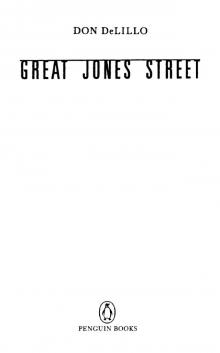 Great Jones Street (Contemporary American Fiction)
Great Jones Street (Contemporary American Fiction)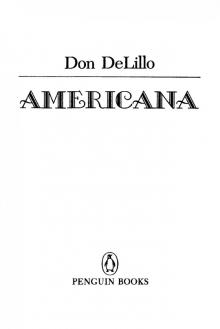 Americana
Americana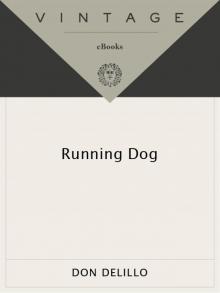 Running Dog
Running Dog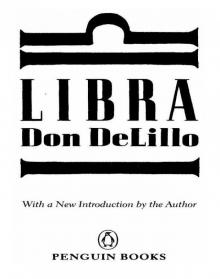 Libra
Libra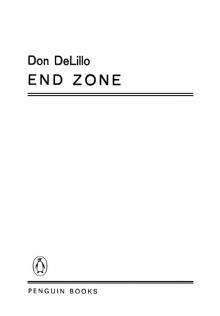 End Zone
End Zone Ratner's Star
Ratner's Star Underworld
Underworld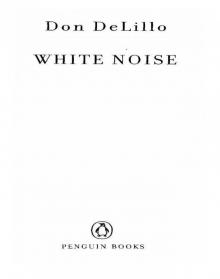 White Noise
White Noise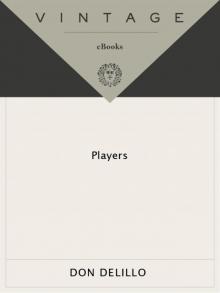 Players
Players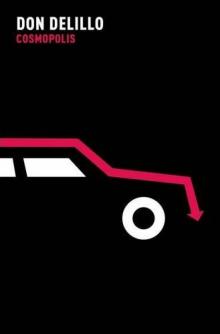 Cosmopolis
Cosmopolis The Silence
The Silence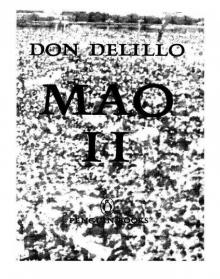 Mao II
Mao II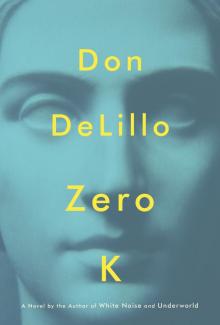 Zero K
Zero K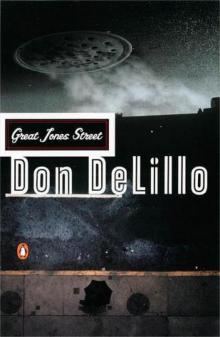 Great Jones Street
Great Jones Street The Angel Esmeralda
The Angel Esmeralda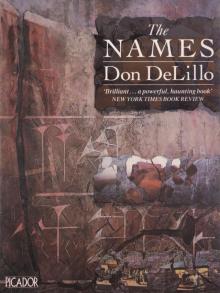 The Names
The Names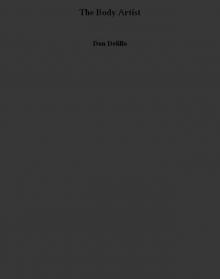 The Body Artist
The Body Artist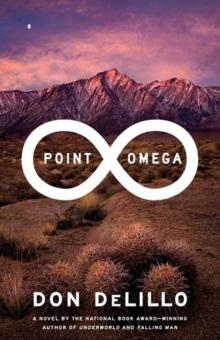 Point Omega
Point Omega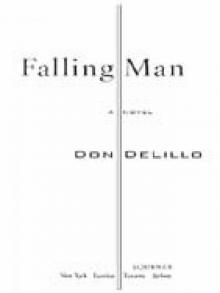 Falling Man
Falling Man